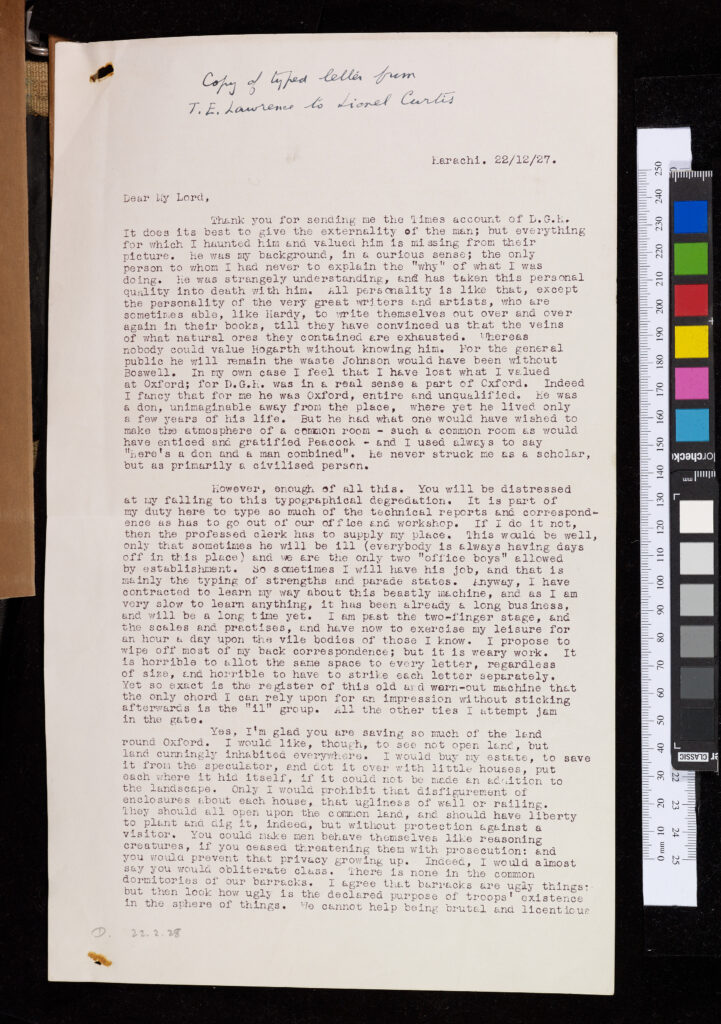1920-22 Draft of the Seven Pillars of Wisdom – Page 5
1920-22 Draft of the Seven Pillars of Wisdom
Page 5
Copy of typed letter from T.E. Lawrence to Lionel Curtis
Merchi. 22/12/27.
Dear my Lord,
Thank you for sending me the Times account of L.of I. It does its best to give the externality of the act: but everything for which I hanted Lim and valued him is missing from their itinerary. He was my background, in a curious sense: the only person to whom I had never to explain the “why” of what I was doing. He was strangely understanding, Lind the btten this personal quality into death with him. All personality is like that, except the personality of the very great writers and artists, who are sometimes able, like Hardy, to write themselves out over and over again in their work. All that have convinced us in the widths of what their ores they contained are exhausted. Theresas nobody could value Hogarth without knowing him. For the general public he will remain the water colourer, rococo have been already Rossetti. In my own case I feel that I have lost what I valued at Oxford for L.of I. was in a real sense a part of Oxford, indeed I fancy that for me he was Oxford, entire and unqualified. He was a glow, undisginated away from the place, where yet he lived only a few years of his life. But he had what one would have wished to make the atmosphere of a common room – such a common room as would have suited six gratified Peacock – and I used always to say “L.and is a con [a[illegible] and a man combined”. He never struck me as a scholar, but as primarily a civilised person.
However, enougn of all this. You will be distressed at my Fuller to this too-personal depreciation. It is part of my duty here to type so much of the technical reports on correspond-ence – a duty I go out of for you and wordpress. If I do it not, then the propsaea archive Ins of history go place. This would be well only if sometimes he will be ill (everybody is always having days off in this place) and we are the onlv two “office boys” allowed by establishment. So sometimes I will have his job, and that is merely the typing of strengths and herode states of agony. I have contracted to learn my way about this beastly machine, and as I am very slow to learn anything, it has been already a long business and will be a long time yet. I am past the two-finger stage, and the sorts and practises, and have now to exercise my leisure for an hour a day upon the vile bodies of those I know. I propose to sift out most of my back correspondence; but it is hardly work, as it is horrible to allot the same space to every letter, “regardless of size, the horrible is huge to single each letter separately. Yet so exact is the register of this old (worruck or worluck?) that only upon it can rely upon for an impression without sticking afterwards at the “11” stroke, all the other ties – distrngd, (am in the gate.
Yes, I’m glad you are saving so much of the lend round Oxford. I would like, though, to see not open lsre, but land casually inhabited everywhere. I would not go satisfied, to save it from the speculator, and cot it over with little houses, put each along it his liberty if it could nol be made an (etding or elding?) to the landscape. Only I would prohibit that disfigurement of enclosures about each house, that ugliness of path or prttle. They should all open upon the common land, and should have liberty to plant and dig the landsnp; but without protection aginst visitor. You would not then behave themselves like reasoning organisms, if you orgased agriculture them with prosecution: and you would prevent that privacy growing up. Indeed, I would stead dormitories of our barracks. But then not how what is the desired purpose of troops’ existence in the sphere of things? To defend what being trtaed and degraded.
Editor's Note: This text has been transcribed automatically and likely has errors. if you would like to contribute by submitting a corrected transcription.
